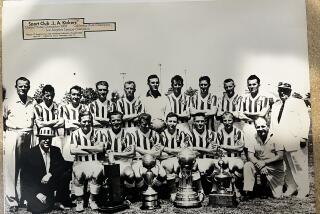On German Attack, Beware of Bierhoff
- Share via
PARIS — If Germany wins the toss tonight and elects to kick off against the United States, the two men in the center circle will be Jurgen Klinsmann and Oliver Bierhoff.
Either Klinsmann will tap the ball to Bierhoff or Bierhoff will tap the ball to Klinsmann.
Either way, the United States will be in for a long night.
Because while the charismatic Klinsmann is the better-known player, with championships galore on his resume, including a World Cup in 1990 and a European Championship in 1996, it is Bierhoff the Americans should fear more.
All he did this past season was become the top goal scorer in Italy with his former club team, Udinese. His 27 goals were two more than another player you might have heard of, Brazil’s Ronaldo.
Scoring at that rate in a league renowned for its defense will get you noticed in a hurry. AC Milan noticed and snapped up Bierhoff for $11 million.
Not content with winning the Italian scoring championship, the German striker then issued a challenge to Ronaldo.
“I’ve always looked for a rival as a point of reference, ever since I was a boy,” Bierhoff, 30, said. “It gave me the motivation I needed to get going. Perhaps I’ll be able to beat Ronaldo again--at the World Cup as well as in the league.”
Ronaldo was held without a goal by the Scots in Brazil’s opening game. Tonight, it will be up the U.S. goalkeeper Kasey Keller, in part, to keep the race even by blanking Bierhoff.
Told of Bierhoff’s challenge to Ronaldo, Keller said:
“More power to him. If he scores 10 goals against Iran, I’ll give him the Golden Boot [as World Cup scoring champion] myself.”
Joking aside, Keller and the rest of the U.S. team know the threat that Germany’s front-runners pose. Klinsmann has been one of the world’s great strikers for almost a decade. Bierhoff has come into own only in the past two years. On the bench, Ulf Kirsten, another proven scorer, sits and awaits his chance, if either fails.
“They are a very talented strike force, there’s no question about that,” Keller said. “They can score a lot of goals, but I have a lot of confidence in the guys in front of me.”
With Keller in the nets, the United States has shut out four consecutive opponents--Austria, Macedonia, Kuwait and Scotland--which has boosted its confidence considerably.
“In the last three or four games, my defense has been tremendous,” Keller said. “I’ve basically been a spectator.”
That is unlikely to be the case tonight, and Bierhoff will probably be the reason why.
“He’s their main target man,” Keller said. “He’s probably 6-foot-3, 6-foot-4, good in the air, good with his feet. You don’t score the goals he scored in Italy without having an eye for that.”
Strangely, though, it has been relatively late in his career that Bierhoff has blossomed as a striker.
Born in the Ruhr Valley city of Essen, Bierhoff had an undistinguished career in the Bundesliga with Bayer Uerdingen, Hamburger SV and Borussia Moenchengladbach. In 1990, he joined Casino Salzburg in Austria, and the following year moved to Italy, joining lowly Ascoli and later Udinese.
Life in the sun agreed with him.
“The sun shines nine months a year and sometimes after training, we go for a pizza,” he said. “What more could I ask for?”
Finally, the goals started to come, just in time for Bierhoff to be called up to Germany’s team for the 1996 European Championship in England. He sat on the bench for five games and then burst into the headlines in the final against the Czech Republic.
He scored a goal in regulation to give Germany the lead, and then, after the Czechs had tied the score, he scored the so-called “golden goal” that won Germany the championship in sudden death.
The Euro ’96 triumph turned him into a star. Now he appears almost daily in the media and adds to his income with a half-dozen or more endorsement deals. All that will last only as long as he keeps putting the ball in the net.
At Udinese, part of Bierhoff’s success was due to the team’s 3-4-3 alignment. The three-forward formation meant there were two other strikers to take some of the defenders away from Bierhoff.
German Coach Berti Vogts is more conservative and prefers a 3-5-2 formation, with only two strikers. It doesn’t help Bierhoff, but he knows there is nothing he can do about it.
“I wouldn’t say I’m absolutely thrilled about the way we play,” he told the Italian newspaper Gazzetta dello Sport. “But then, on the other hand, I can hardly expect them to build the whole team around me.”
Klinsmann remains the offensive leader of the team, and Bierhoff accepts that.
“He sets the pace of the game [and] I follow his moves,” Bierhoff told England’s World Soccer magazine.
Tonight, if the United States wants to score an upset, it would be well advised to follow both their moves. Very closely.
More to Read
Go beyond the scoreboard
Get the latest on L.A.'s teams in the daily Sports Report newsletter.
You may occasionally receive promotional content from the Los Angeles Times.







